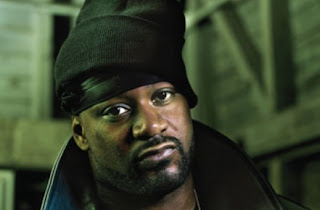 From battling to sampling and anything that falls between, the roots of rap are in opposition. There’s always been a sense that indignant anger about misrepresentation, misinformation, or this-dude-did-that-and-he-shouldn’t-have type shit’s fueled the music of nearly every rap great.
From battling to sampling and anything that falls between, the roots of rap are in opposition. There’s always been a sense that indignant anger about misrepresentation, misinformation, or this-dude-did-that-and-he-shouldn’t-have type shit’s fueled the music of nearly every rap great.
But around the same time rap got actually kinda bad (1997 to the present), something changed. It suddenly got really annoying and even pathetic to hear your favorite rappers remind you how many wack emcees were out there. Maybe it was because you didn’t really want to be reminded of how bad it got, but also because it seemed kinda cheap to point out what’d become the obvious. This wasn’t the spirit of competition or anything, it plain preaching to the converted.
While Ghostface has occasionally been wrongheaded in this corrective fervor–calling out D4L for example–so much of his career since day one has been the right kind of oppositional or corrective rap. He’s always been more a “show” and not a “tell” rapper when it’s come to schooling other rappers, which makes his correctives more like a dialogue or exchange than simply, your favorite emcee bitching too much on record.
Even without it being semi-explicit on “Shark Niggas (Biters)”, it’s clear listening to Cuban Linx that the album’s something of a response or correction to Ready to Die. “If you thought Biggie was describing the life accurately…”, Ghost and Rae seem to be saying, “here’s what it’s really fucking like”. And they give you almost twenty tracks of obsessively detailed drug-dealer rap, with the same cinematic and emotional sweep as Ready while making it (arguably) even more palpable. The result: Two great records instead of one great record and a response record entirely contingent upon telling you why the first record was stupid.
Ghostface’s two most recent proper albums, Fishscale and Big Doe Rehab, had him returning to something resembling his mid-90s storytelling days and away from hyper-abstract wordplay or slice-of-life narratives of late. This obviously had to do with Ghost’s anger at the popularity of so-called “crack rap”, a sort of bastardization or gross misreading of the sub-genre Ghost had a big part in founding.
One of the more interesting convergences was the release of Fishscale on pretty much the same day as Rick Ross’ first single “Hustlin”. I can recall putting in Fishscale having just bought it and getting to the first song, the jaw-dropping “Shakey Dog” and thinking of it as the opposite of “Hustlin” in every way. Rick Ross was repetitive and slow, the song’s all-hook, Ghostface’s song has no hook and teases you with a hook–“Why you behind me, leary, shakey dog stutterin’/When you got the bigger cooker on you/You a crazy motherfucker, small hoodie dude, hilarious…”–but then Ghost just keeps rapping and you realize that just because you heard the title of the song in the song, does not mean you’ve arrived at the chorus. Interestingly, a few songs later Ghost is doing the less fun, played-out version of oppositional rap when he shits on D4L’s “Laffy Taffy” on “The Champ”; doesn’t he realize by simply making and releasing Fishscale, he’s fighting D4L?
Last week saw the internet-release of “Computer Love”, which is Ghost doing the “Holla” off Pretty Toney treatment to Zapp & Roger’s “Computer Love”. Like “Holla”, Ghost eschews sampling altogether and just raps over the original song, finding a sort of internal logic and rhythm without the aid of a proper beat.
Also like “Holla”, he’s doing more than being hilarious/show-offy. It seems in some way, the idea behind rapping right over the Delfonics was to remind people of where all these great Ghostface beats came from. The song equivalent of that moment of every Ghostface show and a ton of interviews where he tells you how this was the music his parents used to fuck to and sways and squeezes to say, “Natural High” by Bloodstone.
Doing the same to “Computer Love” has an even deeper context though and I probably don’t really have to spell it out for you: T-Pain. T-Pain’s use (and abuse?) of auto-tune is certainly on some Roger Troutman type shit and I can see it bugging a guy like Ghostface that a lot of young people probably don’t even know anything about Roger-all the more depressing given Roger’s death-by-gunshot at 47. But rather than simply complain about it, Ghost takes an old Roger song and straight raps over it, invoking–if we read R & B history backwards as so many do–the feeling of a T-Pain-assisted rap song through raps atop Roger’s vocoder croons.
Interestingly, “Computer Love” concedes a bit to 2008 rap standards as well. Ghost slows his rapping down just a bit, which gives it more of a feeling of the rap you hear on the radio. With a punchline like “Martin Luther Bling”, he even engages in some particularly goofball, purposefully bad lines like all of our favorite rappers in 2008. There’s a little more open space in this song than we’re used to from Ghost, which too plays into the ways that radio rap in the past few years has pretty much totally merged rap and R & B. “Computer Love” just kinda of plays out at the end, it doesn’t have the momentum build-up to sudden-stop and end the song feeling that most Ghostface tracks have, and there’s points where he’s barely even rapping, more like spitting a line or two, taking a pause, and saying a few more. It’s about as Jeezy-like as Ghostface can get. A good example of how to ingest all that’s weird or problematic with rap these days and still retain personality.